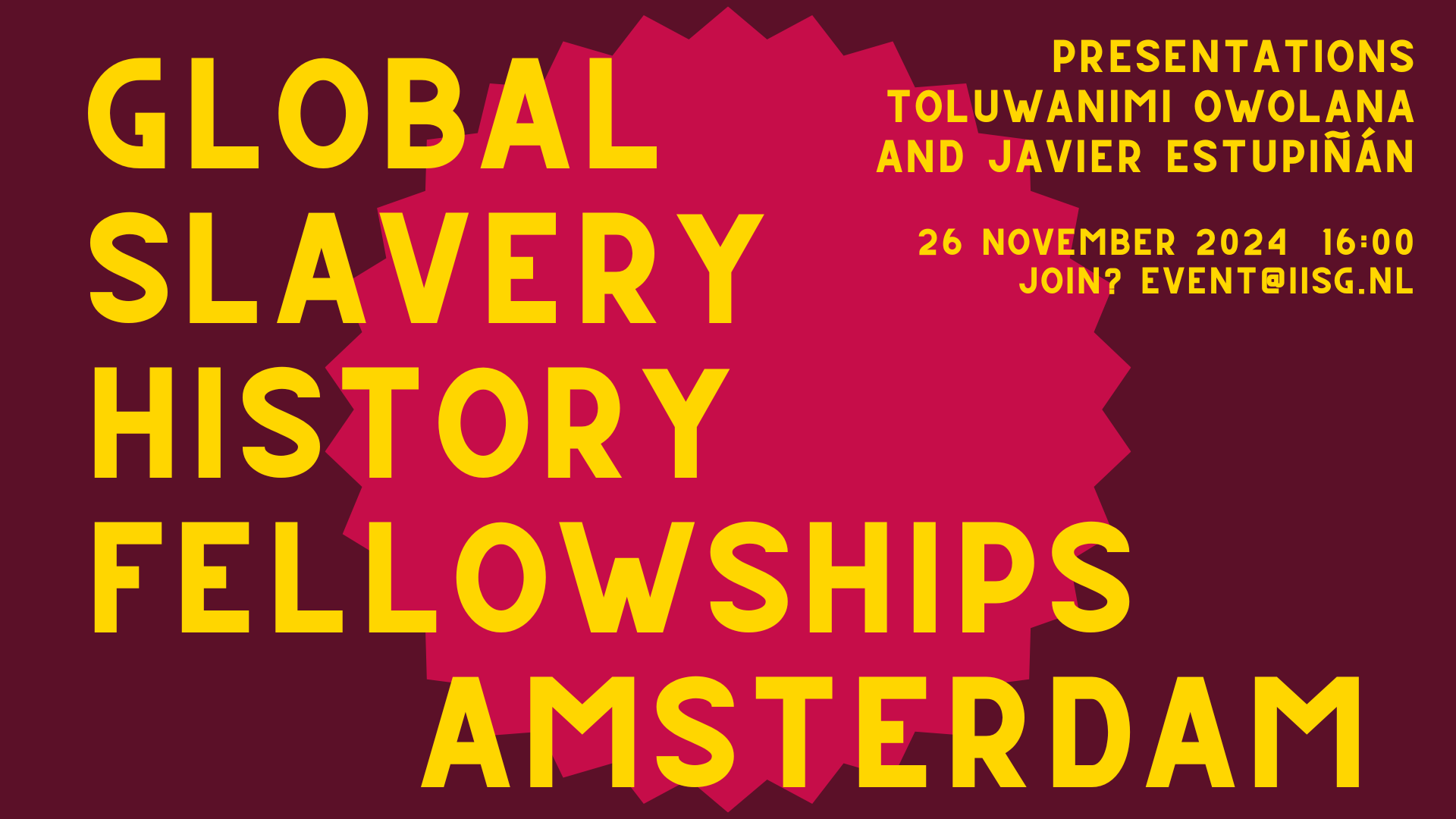Presentations Global Slavery History Fellows
A coalition of Amsterdam based Archives, Museums and Historical institutes has taken the initiative for fellowships for curators, archivists and historians in the field of slavery history. The first two fellows of the Global Slavery History Fellowships - Toluwanimi Owolana and Javier Estupiñán - will present the results of their research on 26 November at the IISH.
Javier Estupiñán - Fortunatæ
Fortunatæ is an audiovisual piece that explores the overlooked history of slavery in the Canary Islands while focusing on the involvement of the Netherlands. By highlighting the colonial past and the historical significance of the archipelago as a strategic location in the transatlantic trade of enslaved people, Fortunatæ challenges the prevailing 'paradise' image of the Canary Islands in the European collective memory. Through a variety of artworks, archival materials, and other historical documents, the piece constructs a narrative that seeks to provoke critical reflection on the complex history of these islands and their ties to Europe.
Toluwanimi Owolana - Reclaiming Representation: Decolonizing Racialized Toys of the Late 19th Century through Digital Illustration and Artifact Biography
This presentation delves into the decolonization of racialized toys from the late 19th century, with a primary focus on the Jolly N-word Mechanical Bank housed in the Facing Blackness Collection at the Black Archives. This artifact starkly reflects the racial biases and harmful stereotypes of its time. Utilizing digital illustration and artifact biography, this project reimagines such objects to challenge their original, dehumanizing purposes, emphasizing instead themes of dignity, resilience, and Black identity.
Through digital illustration, these artifacts are reinterpreted to subvert their intended messages, promoting a vision of empowered representation. Artifact biography complements this approach by uncovering the historical context of each piece—tracing its origins, its role in reinforcing racial stereotypes, and its lasting impact on societal attitudes. This combined methodology invites a transformative dialogue about representation, memory, and the reclamation of cultural narratives. By reframing artifacts with painful histories, this project aims to support decolonizing practices in museums, foster restorative justice, and nurture a renewed perspective of cultural respect and reclamation in heritage spaces. By bringing a decolonizing lens to this artifact, this project aims to support the Global Slavery Fellowship in deepening understanding and empathy for the lived experiences behind such objects, encouraging restorative justice, and inspiring renewed approaches to cultural heritage.
Practical
Date 26 November
Time 16:00
Place IISG, Cruquiusweg 31, Amsterdam
Entrance Free entrance, but please register at event@iisg.nl
Global Slavery History Fellowships (GSHF)
GSHF is a coalition of Amsterdam based Archives, Museums and Historical institutes - Allard Pierson Museum/UB, Amsterdam Museum, Black Archives, IISG, NINSEE, Rijksmuseum, Stadsarchief Amsterdam, UvA, Wereldmuseum - with the generous support of the Insinger Foundation has taken the initiative for a five-year programme that offers three two-month long fellowships per year for curators, archivists and historians in the field of slavery history. The fellowships are open to professionals working on the history of slavery in the Atlantic, the Indian Ocean and the Indonesian archipelago, linked to the Dutch involvement in slave trade and slave labour.
The questions, perspectives, and expertise of young professionals (especially historians, archivists, librarians, and curators) from societies affected by this colonial slavery past and its knock-on effects in the Americas, Africa, and Asia are essential to inform contemporary debates about and dealing with the slavery past. The fellowships aim to support this group of young professionals.
Toluwanimi Owolana is a Nigerian artifact biographer and researcher with seven years of experience designing engagement programs that promote Indigenous narratives and revitalize cultural heritage. She specializes in unraveling the stories behind ancient artifacts to connect contemporary audiences with the past. She is a fellow of the Connecting the Dots Museum Fellowship, hosted by the Goethe-Institut, Nigeria in partnership with the Ford Foundation and the National Museum Benin. She is a recipient of the Cultural Heritage Forward program, an initiative of the U.S. Department of State and the Smithsonian Institution. She is also an alumna of the Hague Academy for Local Governance, The Netherlands where she furthered her expertise on the inclusion of marginalized groups in the cultural industry.
Javier Estupiñán is an audiovisual artist from the Canary Islands whose artistic approach intertwines with his curatorial practices. Since 2022, he co-directs Vega de Agua, an art initiative that develops art residencies and other cultural projects focused on collective and multidisciplinary practices. His works are directly linked to experimentation and often delve into potential pasts to reclaim stories that have been marginalized or hidden.



